Want to know more about the Best Schools For Geology In the US and make an informed decision? Here is a good place to start.
Are you a rockstar in the making? Do you have a passion for rocks, minerals, and the Earth’s crust? Then you may be wondering where to study geology in the United States.
Fear not, aspiring geologists, because we’ve compiled a list of the best schools for geology that will rock your world! From MIT to Caltech, get ready to dig deep and discover the top schools that will take your geological knowledge to the next level.
Please note that schools are selected based on our criteria (at the end of the article), ranked by the latest acceptance rate.
Table of Contents
#25. University of Florida

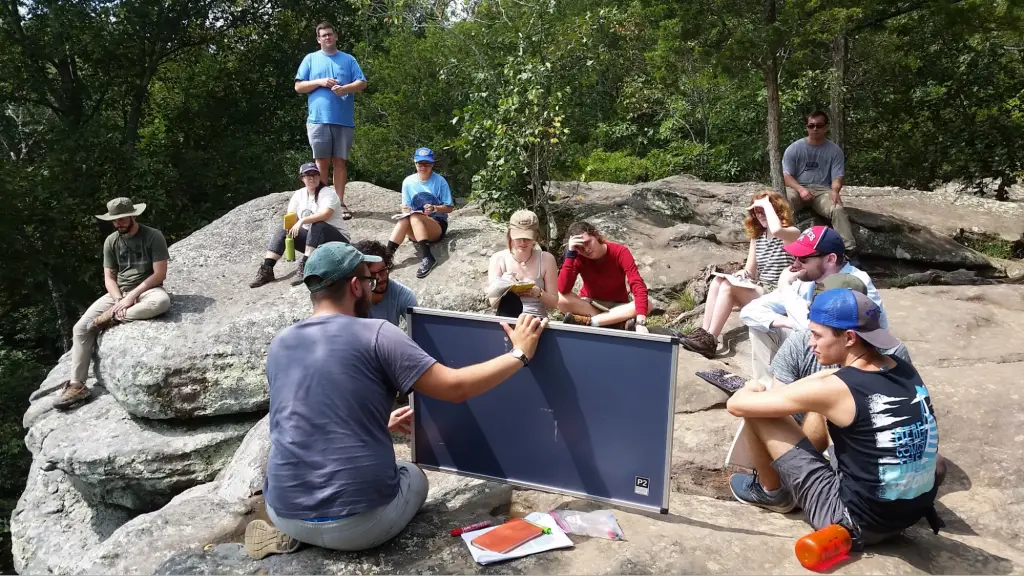
- Acceptance rate: 30.9%
- Average entry score: 1300-1470 SAT or 29-33 ACT
- Student-to-faculty ratio: 18 to 1
- Estimated cost of attendance (tuition and fees): $21,430-$43,708
- Average earning potential for graduates: $38,395 (College Factual)
UF offers a B.S. in geology, which is designed for students that want to pursue a career in the field. The degree provides students with a solid foundation in geology and prepares them for careers as professional geologists or academic researchers.
Students can also opt for the B.A. in environmental geosciences to focus more on the social and political implications of geoscience. These programs open students up to a wide range of job opportunities and allow them to choose their own path through higher education.
#24. University of California, Santa Barbara


- Acceptance rate: 29.2%
- Average entry score: 26-31 ACT
- Student-to-faculty ratio: 17 to 1
- Estimated cost of attendance (tuition and fees): $37,415-$67,169
- Average earning potential for graduates: $36,796 (College Factual)
UC Santa Barbara’s earth science program has a strong focus on geology, with courses covering everything from the Earth’s formation to climate change. Students also get hands-on experience in the field, as they have access to research sites in the country.
Known for its close-knit community, this school offers students a number of opportunities to get involved in research and field work. UC Santa Barbara also has one of the highest graduation rates among public universities in California.
Besides undergraduate degrees, the school also offers graduate programs in earth science and environmental studies. The department is known for its interdisciplinary approach to teaching and research, allowing students to learn from faculty members across departments.
UC Santa Barbara geology graduates have been known to find work with the US Geological Survey and other government agencies, as well as with private companies like ExxonMobil.
#23. University of North Carolina at Chapel Hill


- Acceptance rate: 20.4%
- Average entry score: 1310-1500 SAT or 29-33 ACT
- Student-to-faculty ratio: 13 to 1
- Estimated cost of attendance (tuition and fees): $24,546-$51,725
- Average earning potential for graduates: $28,241 (College Factual)
UNC-Chapel Hill’s undergraduate programs prepare students for their future careers by providing them with the knowledge and skills to succeed in an ever-changing world. Geology students benefit from the university’s strong research faculty, as well as its commitment to teaching.
Students have opportunities to conduct field work and participate in research projects with faculty members. This helps them gain practical experience that can be applied to their future careers.
Other than a B.A. in earth systems, UNC provides students with the option of earning a B.S. in geology, which is designed for those students that want to pursue a career in the field.
Both geology degrees provide students with a solid foundation in the field, but the B.S. degree is more focused on applied areas such as hydrogeology and environmental geology than the B.A.
#22. University of Michigan–Ann Arbor


- Acceptance rate: 20.2%
- Average entry score: 1360-1530 SAT or 31-34 ACT
- Student-to-faculty ratio: 15 to 1
- Estimated cost of attendance (tuition and fees): $32,272-$69,326
- Average earning potential for graduates: $33,679 (College Factual)
Geology majors learn about the Earth’s structure, processes and history. They also learn how these factors influence the planet’s geological record, which can be used to make predictions about future events.
Through coursework and hands-on experiences, students get to know real geologists who are working on problems that are important today—and tomorrow. The department offers both undergraduate and graduate degree programs designed to foster a deep understanding of the world around us.
Their faculty includes geologists with expertise in many areas, including planetary science and biogeochemistry. Therefore, students learn from experts in their field who can help them develop a strong foundation in the subject.
Similar articles like this:
- 25 Best Schools For Agricultural Sciences In The US
- 25 Best Schools For Renewable Energy Degrees In The US
- 25 Best Engineering Schools In The US
#21. University of Southern California


- Acceptance rate: 13%
- Average entry score: 1320-1520 SAT or 30-34 ACT
- Student-to-faculty ratio: 9 to 1
- Estimated cost of attendance (tuition): $60,446
- Average earning potential for graduates: $37,833 (Glassdoor)
USC’s Department of Earth Sciences equips geologists with the skills to tackle the challenges of today’s world. Students learn about earthquake prediction, climate change and environmental sustainability. They also explore the geology of our planet and gain an appreciation for Earth’s history and its future.
The department provides students with a well-rounded education in all aspects of earth sciences, including geochemistry, geophysics, paleontology and more. Graduates are armed with a deep understanding and appreciation of Earth’s dynamic processes and the ability to use this knowledge to solve real-world problems.
#20. Washington University in St. Louis

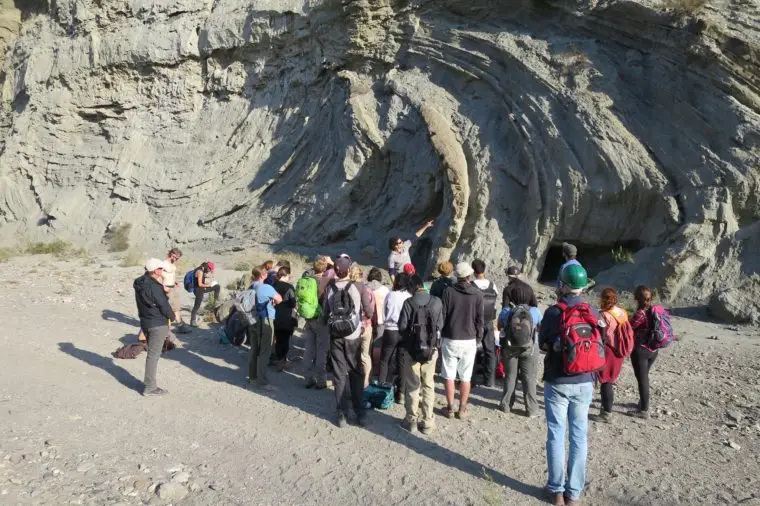
- Acceptance rate: 13%
- Average entry score: 1490-1570 SAT or 33-35 ACT
- Student-to-faculty ratio: 7 to 1
- Estimated cost of attendance (tuition and fees): $79,060
- Average earning potential for graduates: $32,500 (College Simply)
The Department of Earth and Planetary Sciences uses a unique approach to teaching geology. The program gives students the solid scientific and mathematical grounding they need.
This department’s approach helps students gain practical experience while pursuing their degrees to prepare them for careers in the field. The program combines theoretical and practical training. Students learn about everything from the formation of Earth’s crust to its interactions with other planets.
Usually, graduates are well-prepared for work in government agencies, private industry and research institutions. They command salaries that are higher than the average for geologists. Some graduates go on to pursue advanced degrees in areas such as petroleum engineering, environmental science and public policy.
#19. Tufts University

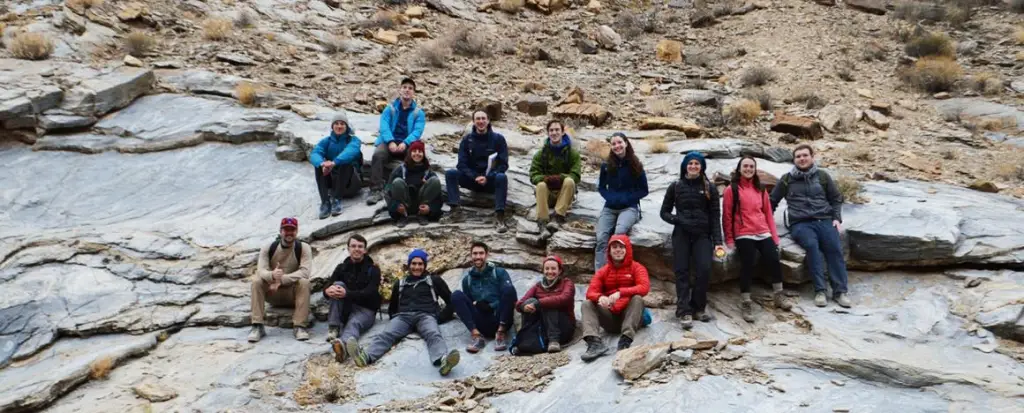
- Acceptance rate: 11.4%
- Average entry score: 1440-1550 SAT or 33-35 ACT
- Student-to-faculty ratio: 9 to 1
- Estimated cost of attendance (tuition and fees): $81,700
- Average earning potential for graduates: $26,742
The Department of Earth and Climate Sciences at Tufts University trains students in the science of earth and climate.
This department’s research is focused on understanding how Earth works at all scales, from microscopic particles to the planet themselves. Students can choose from courses such as geological sciences, environmental geology, or geoscience.
Graduates from this program have the option to go on to work in government, non-profit organizations and industry. They are well-equipped to work in areas such as green building, climate change mitigation and adaptation, or public policy.
#18. Cornell University

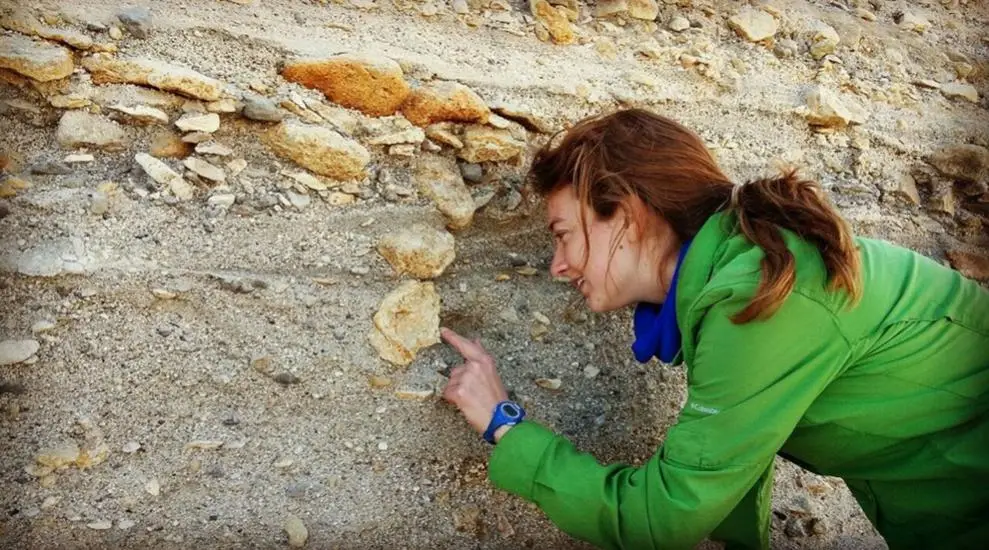
- Acceptance rate: 11%
- Average entry score: 1450-1560 SAT or 33-35 ACT
- Student-to-faculty ratio: 9 to 1
- Estimated cost of attendance (tuition and fees): $78,992
- Average earning potential for graduates: $29,500 ( Cornell University)
Cornell has a well-deserved reputation for producing top geologists who have gone on to make significant contributions to their fields. The school gives students a chance to explore the geology of our planet in depth.
Both the undergraduate and graduate programs are highly competitive, but those who make it in are rewarded with an excellent education. The undergraduate program is designed to give students a solid foundation in geology—its practical applications, as well as the science behind it.
Cornell’s graduate program offers an in-depth understanding of the field and prepares students for careers in research. After earning a degree from Cornell, geology majors have secured work in academia, government agencies, and private industry.
Similar articles like this:
- 25 Best Forestry Schools In The US
- 25 Best Schools For Environmental Science In The US
- 25 Best Schools For Health Sciences Degrees In The US
#17. Johns Hopkins University


- Acceptance rate: 11%
- Average entry score: 1510-1570 SAT or 34-35 ACT
- Student-to-faculty ratio: 7 to 1
- Estimated cost of attendance (tuition and fees): $78,657
- Average earning potential for graduates: $35,500 (College Simply)
Johns Hopkins University offers degree programs in geology through Morton K. Blaustein Department of Earth and Planetary Sciences. The department gives students the opportunity to study the Earth’s climate and life through atmospheric sciences, geophysics, geology, and oceanography courses.
Johns Hopkins University’s graduates have gone on to work for NASA, the European Space Agency, and the National Oceanic and Atmospheric Administration.
#16. University of California, Los Angeles
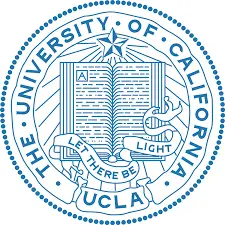

- Acceptance rate: 10.8%
- Average entry score: 1290-1520 SAT
- Student-to-faculty ratio: 18 to 1
- Estimated cost of attendance (tuition and fees): $16,847-$31,949
- Average earning potential for graduates: $33,000 (College Simply)
UCLA’s Department of Earth, Planetary, and Space Sciences (EPYS) continues to be one of the best places in the world for students interested in Earth and space sciences. At the undergraduate level, students acquire a broad knowledge of the field, while at the graduate level they can specialize in a specific area.
But students at all levels have access to high-tech laboratories where they can conduct their own research projects and learn from world-class scientists. Also, students are given opportunities to study abroad, participate in research conferences and competitions, and collaborate with faculty members on their own projects.
#15. Rice University


- Acceptance rate: 9.5%
- Average entry score: 1490-1570 SAT or 34-35 ACT
- Student-to-faculty ratio: 6 to 1
- Estimated cost of attendance (tuition and fees): $74,110
- Average earning potential for graduates: $31,840 (Grad Reports)
Rice University is one of Texas’s most renowned institutions of higher education. It’s located in Houston, a city with many opportunities for geology graduates to find work and advance their careers.
Rice Earth Science equips students with an understanding of the physical, chemical and biological processes that shape Earth. The program prepares students for careers in government agencies, private industry and research institutions.
Rice graduates go on to work in fields such as energy exploration, environmental science and public policy.
#14. Vanderbilt University

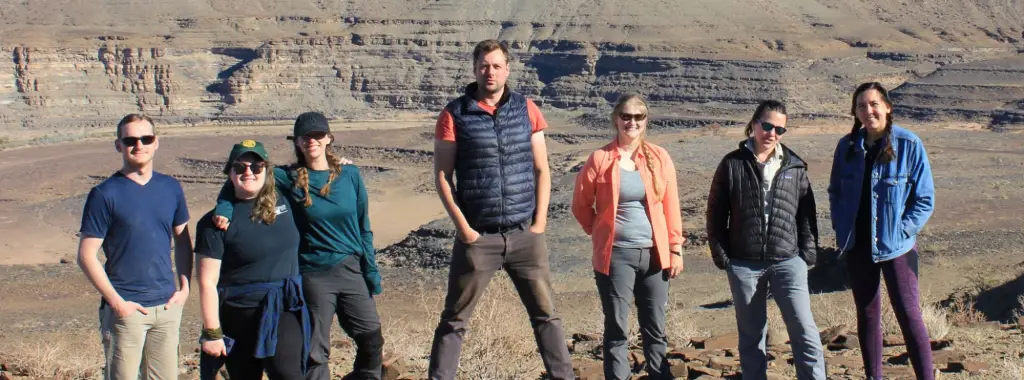
- Acceptance rate: 7.1%
- Average entry score: 1480-1570 SAT or 34-35 ACT
- Student-to-faculty ratio: 8 to 1
- Estimated cost of attendance (tuition and fees): $79,558
- Average earning potential for graduates: $32,100 (College Simply)
This quintessential Southern institution is located in Nashville, Tennessee. Vanderbilt Earth and Environmental Sciences provides students with a broad-based education emphasizing both the sciences and their application to modern problems.
The school boasts a low student-to-faculty ratio, which helps students get to know their professors. Vanderbilt also has a number of research centers and institutes focused on advancing the frontiers of science.
As a result, students have access to cutting-edge equipment and facilities. Vanderbilt also has a strong commitment to providing students with the tools they need to succeed in all facets of their lives.
Similar articles like this:
- 25 Best Immunology Schools In The US
- 25 Best Microbiology Schools In The US
- 25 Best Education Schools In The US
#13. Northwestern University


- Acceptance rate: 7%
- Average entry score: 1440-1550 SAT or 33-35 ACT
- Student-to-faculty ratio: 6 to 1
- Estimated cost of attendance (tuition and fees): $62,391
- Average earning potential for graduates: $58,900 (School Authority)
Northwestern University blends traditional academic excellence with an innovative, collaborative approach to research and learning. Geology students at Northwestern can expect a cutting-edge education from world-class faculty and an intimate community of scholars.
The department’s faculty is made up of distinguished scientists who are committed to teaching and learning, as well as research. Therefore, students have access to cutting-edge facilities and high-quality instruction in both the classroom and field.
#12. University of Chicago


- Acceptance rate: 6.5%
- Average entry score: 1510-1580 SAT or 33-35 ACT
- Student-to-faculty ratio: 5 to 1
- Estimated cost of attendance (tuition and fees): $85,536
- Average earning potential for graduates: $52,341 (Salary)
The University of Chicago is known for having one of the most prestigious economics, mathematics, and statistics departments in the country. This institution also trains geologists and earth scientists to work in the oil industry and other industries that rely on geology.
Both undergraduate and graduate students enjoy the university’s location in Hyde Park, a neighborhood with many historic landmarks and world-class museums. This cool environment inspires students to pursue their passions and think outside the box.
In addition, the university is home to many community organizations that provide students with opportunities for volunteerism, leadership development, and networking.
Geologists who graduate from Chicago’s earth science department will be prepared for various careers. This program provides students with the technical skills needed to succeed in their field and an understanding of how their work affects society and the environment.
#11. Dartmouth College


- Acceptance rate: 6.2%
- Average entry score: 1449-1560 SAT or 32-35 ACT
- Student-to-faculty ratio: 7 to 1
- Estimated cost of attendance (tuition and fees): $81,662
- Average earning potential for graduates: $46,400 (College Simply)
Dartmouth’s Department of Earth Science is a community of scholars and teachers who are passionate about the Earth.
The department offers students an exceptional undergraduate experience, including small classes, individualized attention from faculty members, and opportunities to conduct research with world-class scientists.
This institution also offers graduate and doctoral degrees in geology for students who want to continue their education.
The department’s students are involved in research that spans the entire Earth system and many disciplines, including volcanology, seismology, paleontology, environmental science, geochemistry and geophysics.
#10. Duke University


- Acceptance rate: 5.9%
- Average entry score: 1480-1570 SAT or 33-35 ACT
- Student-to-faculty ratio: 8 to 1
- Estimated cost of attendance (tuition and fees): $84,517
- Average earning potential for graduates: $52,715 (Salary)
Geology majors at Duke University are taught by a dedicated faculty committed to providing a personalized education. Students have the opportunity to take part in research projects as early as their freshman year.
They participate in study abroad programs that combine coursework with field work in exotic locales around the globe.
This prepares students to be competitive in the job market and helps them gain real-world experience. Graduates have what it takes to succeed in their careers, thanks to the broad-based education they received while at Duke.
Similar articles like this:
- 25 Best Material Science Schools In The US
- 25 Best Schools For Math In The US
- 25 Best Medical Schools In The US
#9. University of Pennsylvania


- Acceptance rate: 5.9%
- Average entry score: 1460-1570 SAT or 33-35 ACT
- Student-to-faculty ratio: 7 to 1
- Estimated cost of attendance (tuition and fees): $65,790
- Average earning potential for graduates: $31,800 (College Factual)
The Geological and Earth sciences program at the University of Pennsylvania is a rigorous and challenging undergraduate major, providing students with an in-depth understanding of the basic sciences.
Through an active, hands-on approach to learning, students gain experience in experimental work, scientific writing and communication skills. The program offers opportunities for undergraduate research and professional development.
Students learn the importance of interdisciplinary science and the application of geological concepts to real-world problems. Those who enjoy an active lifestyle will find a home in the Geosciences at Penn.
#8. Brown University


- Acceptance rate: 5.5%
- Average entry score: 1460-1570 SAT or 33-35 ACT
- Student-to-faculty ratio: 6 to 1
- Estimated cost of attendance (tuition and fees): $84,986
- Average earning potential for graduates: $48,577 (Glassdoor)
Geological sciences at Brown University is an interdisciplinary field that draws upon a wide range of scientific disciplines. Students will learn about the Earth’s history, structure and processes from professors who are experts in their fields.
They also have the chance to participate in exciting research projects with faculty members and graduate students. Brown University Geological Sciences graduates enjoy careers as geologists, including working for government agencies or private mining companies.
#7. Yale University

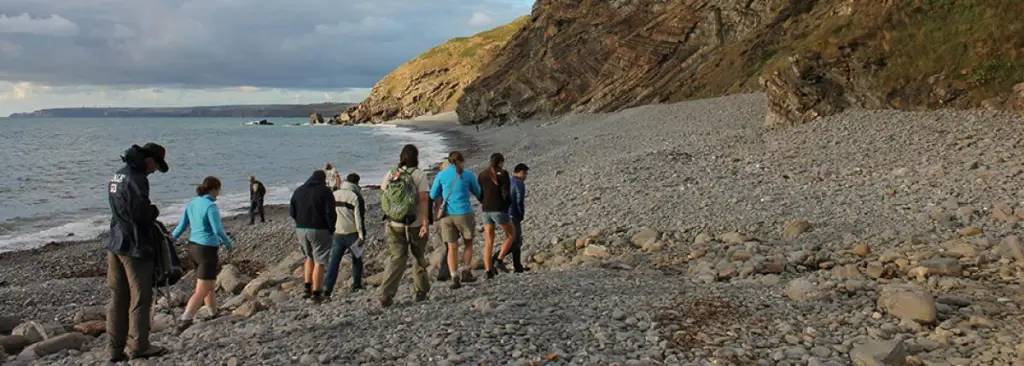
- Acceptance rate: 5.3%
- Average entry score: 33-35 ACT
- Student-to-faculty ratio: 6 to 1
- Estimated cost of attendance (tuition and fees): $84,525
- Average earning potential for graduates: $76,359 (Yale)
Yale’s earth and planetary sciences program combines a strong emphasis on environmental science with an extensive curriculum in the geological sciences. Students will learn about the earth and its natural processes, as well as how human activities affect these systems.
They’ll also gain a deeper understanding of how humans interact with their environment, including issues such as climate change and sustainability.
Yale University offers both undergraduate and graduate degrees in earth and planetary sciences. These programs emphasize interdisciplinary study, combining geology, chemistry and biology elements. Students will learn about the earth’s structure and composition, as well as its history and evolution over time.
What’s it like to study at Yale University?
#6. Princeton University


- Acceptance rate: 4.4%
- Average entry score: 1570 SAT or 35 ACT
- Student-to-faculty ratio: 5 to 1
- Estimated cost of attendance (tuition and fees): $78,490
- Average earning potential for graduates: $88,282 (Glassdoor)
Princeton’s Department of Geosciences produces many talented and well-trained geoscientists. This department has a long history of success, which has resulted in a number of graduates going on to have successful careers in the field.
The Princeton geosciences program focuses on biological, chemical, or physical principles to explain how the Earth works.
With this type of training, graduates will be well-equipped to go on to careers in geology. Some examples include: jobs associated with energy production and management, consulting for government agencies, or working as an attorney in the field of natural resources law.
What’s it like to study at Princeton University?
Similar articles like this:
- 25 Best Multidisciplinary Schools In The US
- 25 Best Gerontology Schools In The US
- 25 Best Nursing Schools In The US
#5. Columbia University


- Acceptance rate: 4.1%
- Average entry score: 1440-1570 SAT or 34-35 ACT
- Student-to-faculty ratio: 6 to 1
- Estimated cost of attendance (tuition and fees): $85,000
- Average earning potential for graduates: $41,030 (College Factual)
The Earth science major at Columbia University is one of the most flexible undergraduate majors in the field. This program covers both the natural sciences and social sciences so that students can gain a well-rounded understanding of our planet’s history and processes.
The program begins with an introduction to the fundamentals of Earth science and then delves into more advanced topics such as plate tectonics, climate change, geochemistry, mineralogy and petrology. Students also learn about how the planet’s history has shaped its current state.
Columbia University geology graduates are highly sought after in the field and have a strong history of success.
#4. Harvard University


- Acceptance rate: 4%
- Average entry score: 1460-1580 SAT or 33-35 ACT
- Student-to-faculty ratio: 7 to 1
- Estimated cost of attendance (tuition and fees): $76,963
- Average earning potential for graduates: $70,300 (School Authority)
Harvard’s geology program boasts an impressive roster of renowned professors who are highly respected in the field. The school offers a range of courses to students, including geochemistry and environmental science.
As a student in Harvard’s geology program, you’ll have access to the school’s extensive library collection as well as its field research facilities.
Harvard’s friendly and supportive environment is conducive to learning and allows students to develop as individuals.
What’s it like to study at Harvard University?
#3. Massachusetts Institute of Technology


- Acceptance rate: 4%
- Average entry score: 1570 SAT or 36 ACT
- Student-to-faculty ratio: 3 to 1
- Estimated cost of attendance (tuition and fees): $77,570
- Average earning potential for graduates: $53,983 (Salary.com)
MIT is known for its strong engineering programs, but it also has great geology departments. The school’s Earth and Planetary Sciences department is home to several internationally recognized professors.
MIT students have access to cutting-edge facilities, research opportunities, and a dedicated geology library.
While at MIT, students acquire a broad range of skills and knowledge in the field of geology. The geology study at MIT is theoretical and practical, so students will be prepared for a wide array of careers after graduation.
What’s it like to study at MIT?
#2. California Institute of Technology

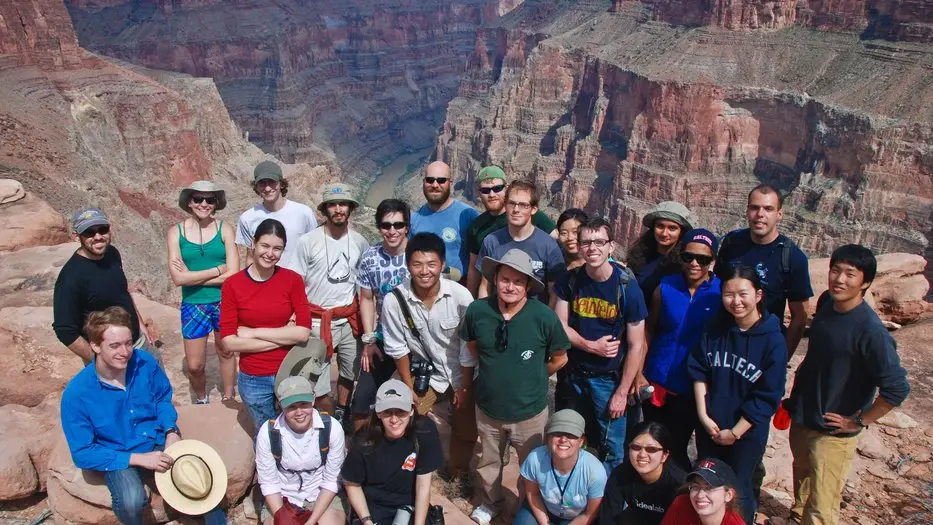
- Acceptance rate: 3.9%
- Average entry score: 1530-1560 SAT
- Student-to-faculty ratio: 3 to 1
- Estimated cost of attendance (tuition and fees): $83,598
- Average earning potential for graduates: $63,339 (Glassdoor)
The Division of Geological and Planetary Sciences at Caltech is one of the world’s premier centers for planetary science. The mission of the division is to conduct basic research in planetary science and related fields, educate students about Earth and other worlds through courses at all levels.
It also provides scientific leadership in exploration missions to advance humanity’s understanding of our solar system.
Both undergraduates and graduates have the opportunity to work with world-class researchers on a wide range of projects and at all stages in their careers.
#1. Stanford University


- Acceptance rate: 3.9%
- Average entry score: 1470-1570 SAT or 34-35 ACT
- Student-to-faculty ratio: 5 to 1
- Estimated cost of attendance (tuition and fees): $78,898
- Average earning potential for graduates: $63,091 (ZipRecruiter)
Stanford University offers both undergraduate and graduate degrees in earth systems. Students will learn about the composition of the earth, as well as its history. They’ll also explore topics such as climate change and sustainability through a multidisciplinary approach.
Combining the study of geology, biology and chemistry is a great way to learn about our planet. Students receive an in-depth understanding of the earth’s structure and composition, as well as its history and evolution over time.
Stanford graduates have been at the forefront of many earth science innovations and discoveries, including the creation of Google Earth.
What’s it like to study at Stanford University?
Conclusion
The US is home to many top-ranked schools for geology, each offering unique strengths and opportunities. When choosing a geology program, consider factors such as faculty expertise, research opportunities, curriculum, and career prospects.
By doing thorough research and evaluating your individual needs, you can find the best school for you to pursue your education and career in geology.
Selection Criteria
Here is a list of the factors we considered when selecting the best schools for geology:
Please note that the order in this list might vary by ranking criteria and sources.
- Reputation and ranking of the school: We looked for schools that have a strong reputation and high ranking in the field of geology.
- Faculty expertise, qualifications, and specialization: We researched the faculty members and their areas of expertise, and qualifications to ensure that the school has professors with relevant expertise and specialization in the areas of geology that are of interest.
- Curriculum and resources: We evaluated the curriculum to ensure it aligns with students’ interests and career goals and considered the quality of the school’s facilities and resources, such as labs, equipment, and libraries.
- Opportunities for hands-on learning and research: We looked for schools that provide opportunities for hands-on experience through internships, co-op programs, or fieldwork.
- Student support services and alumni network: We considered the availability of support services and the strength of the alumni network in providing mentorship, internships, and job opportunities after graduation.
- Extracurricular activities and diversity: We evaluated the availability of extracurricular activities and clubs that align with students’ interests and considered the school’s diversity and inclusivity.
- Networking and post-graduation support: We researched the school’s network of alumni and their post-graduation support for geology students, and also considered if the schools have a strong network of industry professionals and researchers in the field of geology.
Frequently Asked Questions
Q1. What are the top schools for geology in the US?
The following are top-ranked schools for geology:
- Princeton University
- Massachusetts Institute of Technology (MIT)
- Stanford University
- California Institute of Technology (Caltech)
- University of Michigan-Ann Arbor
Q2. What makes a school’s geology program the best?
A school’s geology program may be considered the “best” based on various factors, including faculty quality, research opportunities and resources, and career prospects for graduates.
A top-ranked program may also have a strong reputation in the industry and be highly respected among other universities. These geology programs boast well-rounded and rigorous education that helps students develop critical thinking, problem solving and communication skills.
Q3. What are the admission requirements for top earth sciences schools?
The admissions requirements for geology programs at top schools may vary but will generally require transcripts, test (SAT or ACT) scores and letters of recommendation.
Schools may also require interviews and/or writing samples in some cases.
Q4. How competitive are geology programs at the best colleges?
Many top schools have very competitive geology programs since many highly qualified applicants express interest in these fields of study.
Acceptance rates vary by school. Students should be prepared to have strong academic records, test scores, and extracurricular experiences to be competitive.
Q5. What kind of career prospects do graduates of the best geology programs have?
Graduates of top geology programs may have a range of career prospects, including jobs in the energy industry, environmental consulting, mining, government agencies, academia, and more.
References
[1] Official Websites
[2] Salary Data from Glassdoor, College Factual; College Simply, Zippia
[3] Ranking references including news media such as Colleges Offering a Geology Major.


